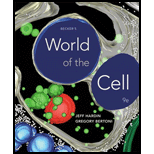
Concept explainers
Arsenate Poisoning. Arsenate (
(a) In what sense might arsenate be called an uncoupler of substrate-level phosphorylation?
(b) Why is arsenate such a toxic substance for an organism that depends critically on glycolysis to meet its energy needs?
(c) Can you think of other reactions that are likely to be uncoupled by arsenate in the same way as the glyceraldehyde-3-phosphate dehydrogenase reaction?
Want to see the full answer?
Check out a sample textbook solution
Chapter 9 Solutions
Becker's World of the Cell (9th Edition)
- Working at cross-purposes? Gluconeogenesis takes place during intense exercise, which seems counterintuitive. Why would an organism synthesize glucose and at the same time use glucose to generate energy?arrow_forwardInsulin-dependent diabetes is often accompanied by hypertriglyceridemia, which is an excess blood level of triacylglycerols in the form of very low density lipoproteins. Suggest a biochemical explanation.arrow_forwardEnzyme: Crystal Structure of Wild-Type Human Phosphoglucomutase-1 (PGM1) the description of the mechanism of how this enzyme is regulated (e.g., depending on the enzyme, the mechanism could range from being solely dependent on gene regulation to protein structure-based mechanism).arrow_forward
- Entire metabolic pathway of galactosemiaarrow_forwardWhich fatty acid cannot undergo β-oxidation in principle, why? Write all the β-oxidation steps for the fatty acid that can undergo β-oxidation, including the cofactors and products.arrow_forwardPredict which one of the five steps of the α-ketoglutarate dehydrogenase complex reaction is metabolically irreversible under physiological conditions and explain why.arrow_forward
- reaction of glyceraldehyde-3-phosphate to form dihydroxyacetone phosphatearrow_forwardRole of Carnitine in fatty acid β-oxidationarrow_forwardStructure, function, Oxidative decarboxylation of pyruvate reactions and mechanisms of activity regulation of pyruvatedehydrogenase multi-enzyme complex.arrow_forward
- biosynthesis of Thymidine monophosphate from ATP, HCO3-, Gln, Asp, quinone, and methylene THF. Show your work and don’t forget that the conversion of U to T only happens AFTER Ribonucleotide Reductase processes the 2’, 3’ ribose to the 3’ deoxy ribosearrow_forwardProperties of an Enzyme of Prostaglandin Synthesis.Prostaglandins are a class of eicosanoids, fatty acid derivatives with a variety of extremely potent actions on vertebrate tissues. They are re-sponsible for producing fever and inflammation and its associated pain. Prostaglandins are derived from the 20-carbon fatty acid arachidonic acid in a reaction catalyzed by the enzyme prostaglandin en-doperoxide synthase. This enzyme, a cyclooxygenase, uses oxygen to convert arachidonic acid to PGG2, the immediate precursor of many different prostaglandins (prostaglandin synthesis is described in Chapter 21). a)The kinetic data given below are for the reaction catalyzed by prostaglandin endoperoxide synthase. Focusing here on the first two columns, determine the Vmax and Km of the enzyme. b)Ibuprofen is an inhibitor of prostaglandin endoperoxide synthase. By inhibiting the synthesis of prostaglandins, ibuprofen reduces inflammation and pain. Using the data in the first and third columns of…arrow_forward. Describe the β-oxidation of the fatty acid palmitatearrow_forward
 BiochemistryBiochemistryISBN:9781305577206Author:Reginald H. Garrett, Charles M. GrishamPublisher:Cengage Learning
BiochemistryBiochemistryISBN:9781305577206Author:Reginald H. Garrett, Charles M. GrishamPublisher:Cengage Learning
